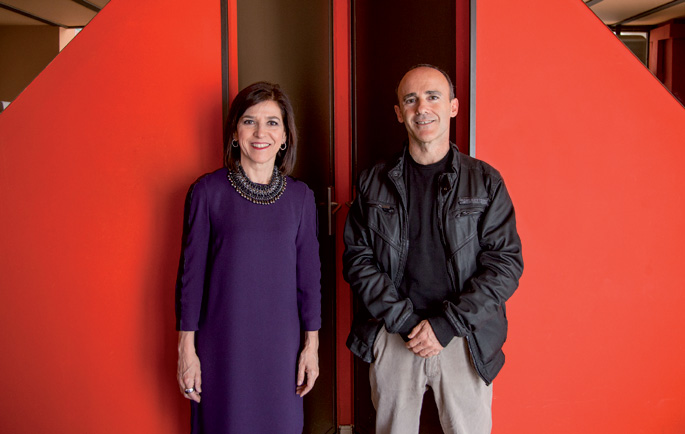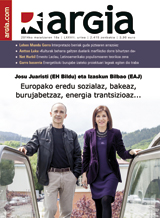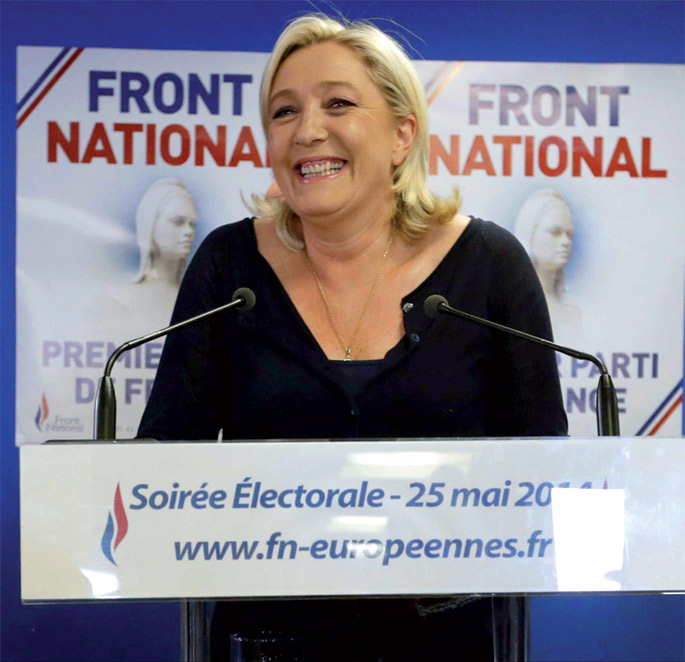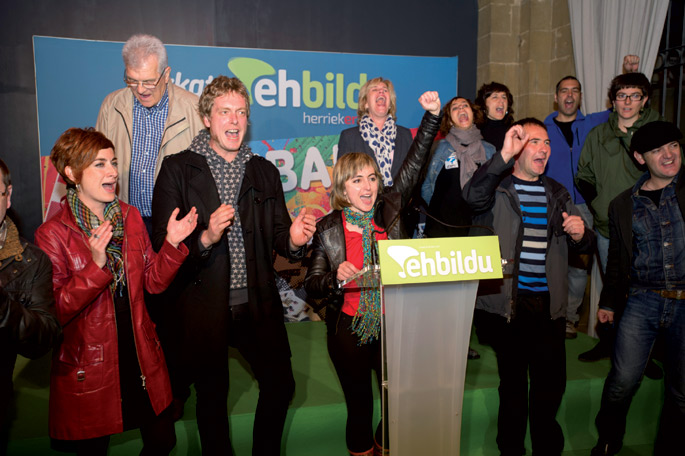One eye in Europe, another in the state
- The intention is to have a seat in the European Parliament following the elections on 25 May. Josu Juaristi Abaunz (Azkoitia, 1964) is the leader of the Peoples list that brings together EH Bildu, BNG and other parties. Izaskun Bilbao Barandica (Bermeo, 1961) is presented for the second time in the Congress of Deputies, and is second in the list of PNV, CIU and Coalition Canaria.

It has been heard that these European elections are more important than ever. Why?
Josu Juaristi: It is very important for us to be in the European Parliament and these elections are also important, because the future of our people and the rights of their citizens are also played in Europe, that is our natural political space.
Izaskun Bilbao On the one hand, they are important because, for the first time, each parliamentary group has to present a candidate to preside over the European Commission, and that is new. On the other hand, surveys say that people's participation is going to be low, but that's nothing new. If we are not in Parliament, no one will speak of the Basque Country. We have to explain that in the Basque Country we have been able to develop another socio-economic model in recent years, and the members of the committee look at what we have done.
When implementing the cuts, governments have taken the European Union (EU) into account. Who is responsible for the consequences of this crisis?
J. Juaristi: The main concern of this crisis is the financial systems and the dire socio-economic management. The point is that citizenship is suffering the consequences. Europe is a precious excuse, a culprit for many issues, and it covers the poor and cruel management of states. In order to have a proper socio-economic model, we need sovereignty, real sovereignty, a state in Europe.
I. Bilbao: We have not joined the measures taken by the European leaders and by that Troika and we have told Barroso that we do not share austerity because it ultimately creates unemployment and reduces the development of employment. But, having said that, it must be remembered that Spain went to Europe saying that it had a problem with the banks. [László] The Commissioner for Employment, Andor, told the Socialist Member when she asked him a question to oppose the debate on Mariano Rajoy: “Spain’s problem is that it doesn’t have an economic model.” This commissioner was in the Basque Country and there he was able to see what we have developed with innovation: “With this model they have half a stop, because they have done well,” he said.
J. Juaristi: I do not agree with that socio-economic model of my own, that if we have had it, it is seriously declining. The governments of Lakua and Pamplona can do much more. It is true that the Spanish factor is a great burden and it does us a lot of damage, but in the institutions here you can do another policy, you can invest a lot more in industry, in education or in health. I also see responsibilities closer.
I. Bilbao: 73% of the Basque Government’s budgets are social spending, looking for a European region with this percentage. We want to be a nation in our demands, but when we talk about politics we are also an example for the Commission.
The members of the Commission, the Council and the European Central Bank are not elected by the citizens. Is there a lack of political legitimacy there? What if there were, could that be the reason for the relationship between the Union and the citizens?
J. Juaristi: The EU has many democratic deficits in many areas. To a large extent, today’s very functioning has dispelled the public by the lack of transparency, because it is seen as something alien. I don't think politics is discredited, but the political elite is. And I have the feeling that many times with that great abstention in the European elections some of the political elites feel quite comfortable, because they do not want more direct and active citizen participation.
I. Bilbao: The European project must be much more federal. It would be good if society could directly elect the President of the Commission. Europe needs clear leadership, it makes no sense for there to be a President in the Commission and in the Council, there must be a single President and it must have more powers than what Parliament now has. More than a lack of legitimacy, I would say that there is still much to be done. What remains of our scheme is the Council, where there are states and often they are an obstacle to their behaviour and lack of transparency.
The presence of the extreme right in the European Parliament is going to be greater than ever. What or who feeds the xenophobic and unsupportive Europe?
J. Juaristi: The ideological struggles of the right in recent years. Since the outbreak of the crisis in 2008, the right has left the free path to fascist and xenophobic ideas. It is true that the polls say that they are going to go up a lot, that they are going to form a group for the first time and that they can have up to 100 parliamentarians. Neither the Right nor the Socialist parties have tackled this phenomenon properly, nor have they reacted to many serious things that have happened in many states. However, the Left will also have more strength, and we do believe that this is good news.
I. Bilbao: There are two reasons for people to trust xenophobic and eurosceptic groups. On the one hand, many people are disappointed with Europe. You have to turn that around, so that people really know what you're doing; you also need the help of the media, because they're always negative questions. Some are disappointed with Europe, it is the Troika, it is austerity, because with immigration there is no clear policy, because there is no common strategy against unemployment or in pensions a minimum for all Europeans. That social Europe must work. And then there are other Eurosceptics, xenophobes. What are they? Those who see that with the measures taken in recent times the states, as we have known in the twentieth century, are disappearing, have less and less sovereignty. In France we are seeing it with Le Pen. They will all multiply, but perhaps we will also have the opportunity to think about what we have not done well.
It says we ask negative questions, but the data is too. According to one study, over 23,000 deaths have been recorded in recent years with the intention of reaching Europe. That has not been brought by Le Pen, it is a consequence of the policy of governments of many colors…
I. Bilbao: When the Lampedusa affair happened, Commissioner Malmström addressed the Council, proposing concrete measures. What did most states say? It wasn't their problem. That has to be overcome, we cannot meet the states when there are problems of this kind, because it is a European problem. But there is also encouraging news, such as the Erasmus programme, that we have increased the budget by 40%.
What do you think of Europe’s social policy in the field of immigration and in other areas?
J. Juaristi: The EU does not have a social policy, there is no European social model, there are at least 28. One of the problems is that it does not have sufficient force to act and the States do what is in their interests. As Izaskun mentioned, minimum standards are needed: the EU should guarantee basic social, economic and even political rights.
How do they value the EU’s role in the face of sovereign processes in Scotland and Catalonia? The President-in-Office of the Council, Herman Van Rompuy, has assured us that secession is not in the interests of those who demand it.
I. Bilbao: They are political statements, empty words. Let us take a look at the European trajectory: With the reunification of Germany, 16 million people turned from one day to another European. Where is the procedure? It was a political decision. Scotland, Catalonia, even in the case of the Basque Country, which was our process with Ibarretxe, Europe must create a general framework so that we all know what procedures must be followed. Scotland is European and she is entitled, I am European as a Basque, but I do not have the same right. We are doing tax harmonisation, why are we not doing the same at the political level? It could be an internal expansion. Here everything is political decision.
So would political harmonisation be needed in Europe to carry out this kind of process, or does each have to make its way? The Catalan road, the Basque road…
J. Juaristi: These basic rights should be guaranteed by a general European framework. The anti-democratic nature of Madrid is what has portrayed the case of Scotland. The statements by Van Rompuy and Barroso have been the result of a political impulse that he described as improvised. The Spanish State is increasingly present as a lobby in Brussels and Strasbourg. A bilateral agreement, a cordial relationship, is not possible. Giving voice and decision-making power to the citizens is the European protocol that needs to be implemented, and it is not a utopia, it is a democracy.
The Lehendakari Ibarretxe advised Šesku Dago at a conference in Bilbao: “Go ahead but together.” Would the PNV and EH Bildu be prepared to join the European Parliament in favour of the right to decide?
I. Bilbao: This is nothing new. A year ago came Iñaki Irazabalbeitia [Aralar has rotated his seat with ERC and BNG] and we had a good relationship with him. We have tabled a number of questions, such as the Parot doctrine, and we also bring the Egunkaria case to Parliament.
J. Juaristi: The right to decide is a key to us, a democratic resource, and whether that is an instrument of collaboration, from us.
I. Bilbao: We are among the groups of minority languages and of stateless nations and at the last session we approved what we have called the ‘Strasbourg Declaration’. It says that people's rights and identities must be recognized. We have worked for five years between the groups to get that statement, but it has not given us time to bring the debate to Parliament. The dimension is another, but the road has already begun.
J. Juaristi: To get there the first thing we have to do is push here, here is the wave; that will make it very easy to reach the European Parliament.
Statements are one thing, and what they bring in practice is another thing. For example, on the subject of minority languages there is the European Parliament, but France does not respect it and the Government of Navarra has also been warned on numerous occasions. How can we guarantee their respect?
I. Bilbao: This year, for the first time in history, a report on the defence of minority languages, the Alfonsi report, has been adopted in the European Parliament. Five years ago it was an illusion for us. We in Parliament must work on our own initiative. Are things heavy? Yes. Would we like to go faster? Also. It is not consistent that some things are not complied with after they are accepted. That is why we say that we in Europe need strong institutions so that those who do not comply with what has been approved will have consequences.
J. Juaristi: We must demand that the EU respect fundamental rights; in our case, language rights are very important. It is not possible that there are such different realities in democratic culture.
I. Bilbao: There are also positive aspects. It should also be remembered that Euskaltzaindia has been awarded the Europe of Literature Prize.
What must be done to ensure that the peace process in Euskal Herria is finally incorporated into the European Union’s agenda?
J. Juaristi: Continue to work with us, work here to facilitate the EU’s change of attitude. A statement was made in the European Parliament in 2006, and there is also Basque Friendship. All these diplomacy and contacts must be strengthened.
I. Bilbao: A Peace programme adapted to the Basque Country would be good, as in Ireland, so that Europe would be involved in the peace and reconciliation process. From the Conference on Peace and Coexistence set up in the Basque Parliament, a proposal should be made with which to turn to the European Commission.
In it, therefore, an agreement can be reached to present the matter in Europe in a different way.
J. Juaristi: Also before the states. We should ask Paris and Madrid more vigorously than there is now. The work being done here is strategic for Europe, but we need to present in Madrid a much stronger position as a country. That is what it is going to move and then Europe is going to react.
I. Bilbao: Two parts have to be called for. To Madrid and the institutions, on the one hand, and to ETA on the other. Efforts must be demanded of all.
J. Juaristi: But you do what you can.
I. Bilbao: Our party has been there from the outset, speaking with one or another of discretion, of the people in politics and in prisons. The situation is not easy for anyone.
J. Juaristi: If, at the moment, you have to put pressure on someone, and I am not saying this alone, so does Jonathan Powell, you have to put it to the Spanish State.
The trade agreement between the United States and the European Union is being agreed and approved by the European Parliament. Ecologists believe that European environmental legislation will weaken and facilitate the use of fracking. What direction does Europe take in the energy transition?
J. Juaristi: This negotiation is being carried out confidentially, it is very important but it is being carried out clandestinely and will have serious consequences. Fracking and other things will get us through the back door.
I. Bilbao: I am certainly in favour of the agreement with the United States. This agreement not only entails changes in the energy sector, but also creates great opportunities for companies and industries here. Another thing is fracking, renewable energies or nuclear energies. Europe needs energy self-sufficiency. We have called for a commitment to renewable energy. On fracking and other alternative fuels, reports have been adopted in the Basque Parliament saying that research must be done, but always respecting the environment and the safety of people.
J. Juaristi: I am Azkoitiarra and our people are full of projects to make holes in the fracking. We disagree. Europe must commit itself to alternative and sustainable energies, it talks about the green economy, but then it is not taken seriously.
I. Bilbao: Europe already has its position, but then every state does what it wants. Europe alone cannot be blamed.
Many things are decided in Europe that affect our citizens on a day-to-day basis, including the waste management that has generated many debates in our country. What does Europe say and what do we do?
J. Juaristi: I believe that the European directives are the right ones and the ones that must be complied with. What do they say? Avoid waste generation. That's a part of the social transformation that we have to do, perhaps a technical part. What surprised me is how the PNV has adopted a technical thing as a political tool.
I. Bilbao: The European directive says that there must be a hierarchy and says that landfills must disappear. One thing is how we collect the garbage, but then what do you do with the garbage? And it's that debate in Gipuzkoa. We have asked the European Commission whether things are clarified.
Europe also says that nothing that is recyclable can be incinerated.
I. Bilbao: Zero garbage doesn't say it. It says that an effort must be made to create as little as possible, but there are always a lot of things that cannot be done and that must be valued. It says that of intoxication, in the previous steps of effort, not to burn everything.
Most Moved Holder: The PP has won the elections, especially because it has eaten Citizens in its entirety, and the PSOE remains roughly equal, keeping three out of ten total voters. Therefore, the PSOE has maintained the battle and a half badly seen what has happened in Europe,... [+]
Europarako Liberal eta Demokraten Aliantzak (ALDE) UPyD alderdia onartu du, talde berean dauden EAJ eta CDCren kontrako botoekin. Trukean, autogobernuari buruzko azpitaldea sortzea onartu du ALDEk.
Europako hauteskundeen ostean Syriza, Greziako ezkerreko koalizioa, herrialdeko lehen indar politikoa bihurtu da. Kostas Isychosek, alderdiaren kanpo politikaren arduradunak, “politika alternatiboentzako itxaropen boto” gisa deskribatu ditu emaitzak, Marta... [+]
Eduardo Muriel kazetariak Podemosek Europako hauteskundeetan izan duen arrakasta aztertu du La Marea hedabidean.
Alderdi ultraeskuindar eta populistak indar handiz sartu dira euroganberan.Frantzian Fronte Nazionalak panorama politikoa astindu du, eta Espainian bipartidismoak galera itzela izan du.
Ezkerrak egin du gora Erkideagoan eta ezkerrak egin du gora Nafarroan. Espainiako Estatuan ere ezkerrak gora egin du (IU). Eta Katalunian berriz, Esquerrak irabazi du. Kataluniak Esquerrari eskerrak Europako bidean Estatu izateko bidean beste urrats bat gehiago eman du.
Hauteskunde europarrek emaitza esanguratsuak utzi dituzte Frantzian. Iritzi-azterketek iragartzen zuten bezala, eskuin-muturreko Frente Nazionala (FN) lehen tokian iritsi da bozen %25arekin. Horri esker, 23-25 eserlekuko eskuratu ditu, europar legebiltzarrean indarrarekin... [+]
“Igandeko emaitzak ezin dira balizko foru hauteskundeetara ekarri”, gaztigatu zigun Yolanda Barcinak duela hiru egun, maiatzaren 23an. Gauza bera erran du Sergio Sayas UPNko komunikazio idazkariak: emaitzak ez dira ekartzekoak, “Nafarroako alderdi nagusia... [+]
“Oraingoan, ezberdina da” zioen, fede baino borondate gehiagorekin agian, Europako Parlamentuaren web orri ofizialak aurtengo hauteskundeen aurkezpenean. Lisboako Itunaren ebazpenak aintzakotzat hartuz egindako lehendabiziko bozketak zirela azpimarratzera zetorren... [+]
Horrela deitzen du Luis Moreno ikertzaileak lehengo urtean plazaratutako bere liburua. Eta horixe da niri hauteskunde gauaren ostean geratu zaidan sentsazioa.
Atzoko hauteskundeek utzitako titular nagusia Europa mailan alderdi euroeszeptikoek izandako igoera da ezbairik gabe. Ultraeskuinari dagokionean, arreta gehien bereganatu duen kasua frantziar estatuko Front Nationalen kasua izan da. Marine Le Penen alderdi ultraeskuindarrak... [+]
Ordezkari bana bidaliko dute Bruselara EAJk eta EH Bilduk datozen bost urteetarako. Euskal Herrian EAJk atera du boto gehien, zazpi lurraldeetan aurkeztuta: 220.885. EH Bildu Hegoaldean bakarrik aurkeztu da, eta bertan lehen indarra izan da. EAEn EAJk irabazi du, Nafarroan PPk... [+]
Info Zazpik idatzitako txio batean zioen Antonio Alvarez Solis kazetariak: “Estaturik gabeko nazioentzat Europako munstroaren aurrean beharrezkoa da ahotsa izatea”. Ez dut ukatuko garrantzitsua ez denik, baina hortik zorionak esateraino…

















